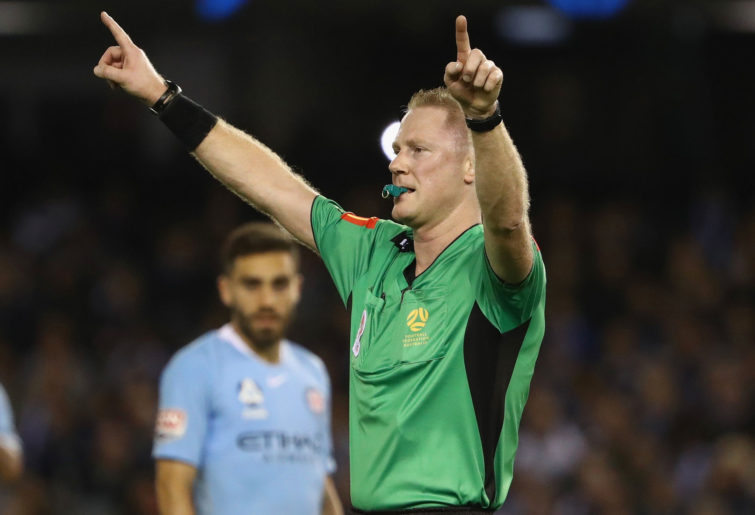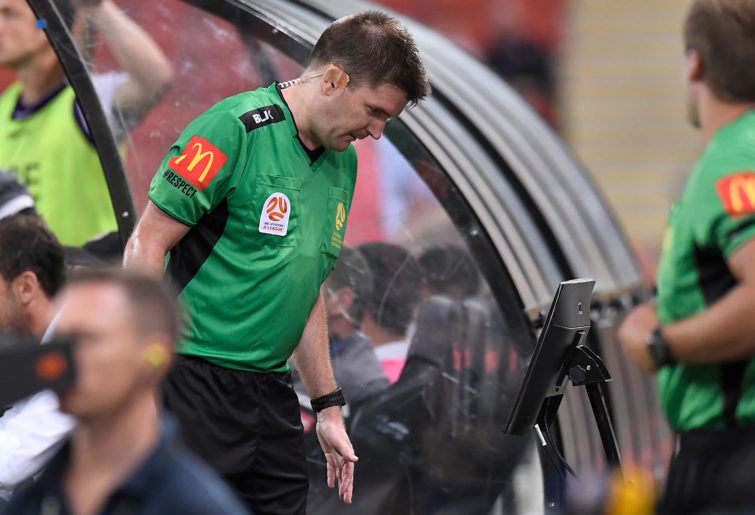Another round of the A-League has concluded, and yet again it is not the high-scoring football nor the success of Australia’s youth that is making headlines all around the nation.
Instead, the mistakes of the video assistant referee (VAR) have left fans talking, after three controversial penalties were awarded to Adelaide United in a 3-2 victory at home on Friday night against league leaders Central Coast Mariners.
Understandably fans were left confused and angry at how the system that is meant to stop poor decisions did not appropriately intervene, with A-League referees boss Strebre Delovski even conceding that the wrong calls were made.
Since the beginning of the early 2000s, sport and technology have become successfully intertwined.
Whether it be cricket and their decision review system (DRS), tennis and their hawk-eye technology or rugby league and their video referees, these innovations have become a seamless part of the respective sports.
Football on the other hand has had many of its matches plagued with controversy relating to the VAR, with decisions that seemingly should be reversed not being reversed, and clear indiscretions being left unpunished.

(Photo by Robert Cianflone/Getty Images)
VAR made its worldwide top-flight debut on April 7, 2017 in a Round 26 A-League match between Melbourne City and Adelaide United.
Football in relation to tennis, which debuted its hawk-eye system at the 2006 US Open, were relatively late to the party, unsurprising for a sport so entrenched with deep-rooted traditions and a proven resistance to innovation.
Despite the fact that the technology used for hawk-eye would be extremely helpful to rule of goal-line decisions, it took a further six years, and one memorable incorrect decision in the 2010 World Cup between Germany and England, before it was implemented.
The eventual success of this innovation left fans eager to see if other facets of the game where regular poor decisions were consistently being made could be fixed by essentially a second pair of eyes.
But three years on and fans and pundits have already deemed the trial a failure, and one that the world game would be better off without.
This begs the question, why are other sports being improved by the assistance of technology, while football is suffering?
Football rules, unlike many other sports, are not based on definitives.
In tennis the ball is either in or out, and in cricket it is either pitching in line for a LBW decision or it isn’t.
This is why these systems work so well: there is a right and a wrong decision, with no ambiguity and no room for debate.
There is, however, too much subjectivity to FIFA’s laws of the game. A machine and cameras do not have the ability to properly adjudicate the rules.
The VAR is ultimately still relying on humans to operate it. Technology can provide a magnitude of camera angles and information but it all comes down to the operator to interpret it.
For this exact reason, the VAR will always attract controversy that simply will not exist in relation to the umpiring of sports such as cricket and tennis, where humans are not needed to aid in its administering of rules.

(Albert Perez/Getty Images)
The NRL’s video refereeing system does face many of the same challenges of the VAR, and its success since its inception in 1998 should give football fans hope.
While it has not always been perfect, with rugby league having its fair share of controversy relating to the system, it has got to the stage where fans have slowly gained confidence in the technology’s ability to work.
It is unrealistic to expect every decision to be correctly given. These referees are ultimately human and no matter the number of replays provided, they will sometimes make mistakes.
However over time the NRL has tweaked their processes, causing wrong decisions to become an anomaly.
The VAR system is vital in modern football, and it would be premature to abandon it after only a couple of seasons.
Football is not a game of exacts. So many of its rules are based on subjectivity and human interpretation, and while this is the case, the VAR will never produce the correct decision 100 per cent of the time.
Before its implementation in 2017, every weekend’s football news would be filled with discussions about wrong offside calls and missed red cards. This is now rarely the case.
While Friday’s game produced some controversial decisions, when looking at it, these matches that are defined by wrong decisions are becoming less frequent.
The facts prove that the VAR is, in most cases, producing the correct decision.
It must be given time, like the NRL gave their video referees, to get better and more consistent in its adjudications.
Football is moving in the right direction, and while it may never be perfect, the VAR is here to stay.






























































































